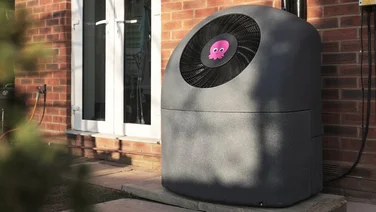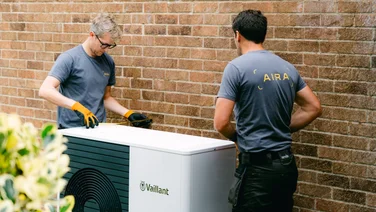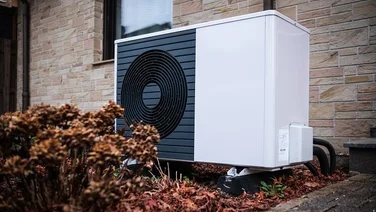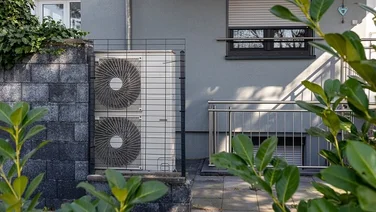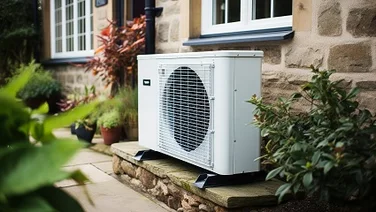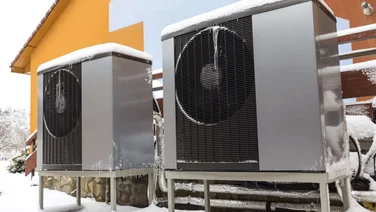We receive a small fee from trusted installers when you request a quote through our site. This helps us keep our content independent, well-researched and up to date – Learn more
- Heat pumps vs boilers: how they work
- Heat pumps vs boilers: popularity
- Heat pumps vs boilers: upfront price
- Heat pumps vs boilers: home upgrades
- Heat pumps vs boilers: running costs
- Heat pumps vs boilers: efficiency
- Heat pumps vs boilers: environment
- Heat pumps vs boilers: hot water
- Heat pumps vs boilers: maintenance
- Next steps
- Generous government grants mean heat pumps cost around the same as boilers
- Heat pumps often cost less to run than a boiler
- New heat pumps can produce water as hot as a boiler, but not instantly
- You may need new insulation and radiators when getting a heat pump

Boiler on its last legs? Like many others, you may be weighing up whether to get a new boiler or switch to a heat pump.
Either way it’ll cost thousands, but a heat pump may be a better buy in the long run. For starters, it has up to double the life expectancy of a boiler. It’s also more efficient, more future-proof and much more environmentally friendly.
There are a few catches, though. Heat pumps can’t produce instant hot water like a combi boiler. And if your home loses heat easily, a heat pump may struggle to keep it warm unless you invest in better insulation and bigger radiators.
These factors, plus misinformation about heat pump running costs and cold weather performance, have held back uptake in UK homes.
Installations remain below government targets despite rising 43% in 2024. That’s a shame, because a heat pump is a more cost-effective choice than a boiler for many homes.
Here we’ll bust the myths about heat pumps vs boilers and take an honest look at which is best for you, your budget and your heating needs.
What type of central heating do you currently use?
Get startedHeat pumps vs boilers: how they work
Most types of heat pump and boiler work by heating water. The hot water then flows through pipes to your home’s radiators, before heading back to be re-heated.
The main difference is in how they heat water. Gas boilers do this by burning natural gas, but air source heat pumps heat water by absorbing heat from the air outside. They can even do this in the middle of winter.
This “air-to-water” heat pump process is tricky to explain, but let’s give it a go. First, the outdoor unit extracts heat from the air (or from the ground, if you have a ground source heat pump) . The heat is absorbed into a liquid refrigerant, which turns into gas and is compressed by the heat pump to increase its temperature.
A similar process takes place in air conditioners and fridges, but in reverse.
The hot compressed gas then heats your water supply and flows into your radiators. Essentially, this:

This heats water less quickly than boilers do. A combi gas boiler can generate instant hot water, but heat pumps can’t.
With a heat pump system you normally need a tank to store hot water for baths, showers, washing up and so on.
There are other types of boiler and heat pump. Oil boilers are popular in areas without reliable gas supply, and air-to-air heat pumps circulate warm air through vents. Here, we’ll focus on the more popular gas boilers and air source heat pumps.
Heat pumps vs boilers: popularity
Boilers remain much more popular than heat pumps in the UK, although heat pump adoption is growing fast.
The rate of heat pump installations grew by an impressive 43% in 2024. Almost 60,000 certified heat pump installations were carried out that year, according to the Microgeneration Certification Scheme (MCS). That brings total UK installations to over 275,000.
However, that’s well below government targets of 600,000 heat pump installations per year by 2028. Around 1.5m gas boilers were installed in the UK in 2024, dwarfing the number of heat pumps.
Britain is playing catch-up on this. Heat pumps are far more popular in mainland Europe, China and the US. In America alone 4.12 million heat pumps were bought in 2024, not far behind the 5.56 million sales of air conditioning units.
Are gas boilers being banned?
A few years ago the UK government announced a ban on the sale of new gas boilers from 2035, but this is no longer happening. The current plan is to phase out 80% of boilers by 2035. This includes a ban on gas boilers in new build homes.
Heat pumps vs boilers: upfront price
Heat pumps cost more than boilers off the shelf, but government grants cover a big chunk of the price. You don’t get the same discount with boilers.
A heat pump system – including outdoor unit, indoor unit and hot water tank – costs a typical £12,500 to buy and install before you subtract the grant. After the £7,500 Boiler Upgrade Scheme (BUS) grant is taken off, you’re left with £5,000 to pay. Your MCS-certified installer will automatically subtract the grant amount from your bill.
Octopus Energy told us it can install a heat pump for as little as £500 after the grant is taken off. On average, though, expect an upfront price of around 10 times that.
By contrast, a new boiler costs between £500 and £3,000 off the shelf, or between £1,200 and £4,500 including installation.

Get £7500 towards your heat pump installation through a trusted installer
An MCS-certified heat pump installer can apply for the Boiler Upgrade Scheme on your behalf, get a quote from one now
Heat pumps vs boilers: home upgrades
You’re highly unlikely to need any additional home upgrades when you get a new boiler.
With a heat pump, though, there may be extra work to fork out for. The most common required upgrades are extra insulation and larger radiators.
Radiators
You may be able to use your existing radiators with a heat pump, especially if they’re big. But if they’re on the small side, they may not enable a heat pump to get your rooms warm enough. Installing bigger radiators costs from around £250 per radiator.
Alternatively, choose a heat pump that can produce water as hot as a boiler. The Mitsubishi Ecodan R290, for instance, can generate water as hot as 75°C, even when it’s below freezing outside.

Insulation
You should insulate your home‘s walls, roof and floors before installing a heat pump. The faster your home loses heat, the bigger and more expensive a heat pump you’ll need – and home insulation costs a lot less than a big heat pump.
Insulation is essential whether or not you have a heat pump. Home insulation is now zero-rated for VAT until March 2027, and it will knock hundreds off your energy bills.

The only way to know for sure whether you need to make any changes to your home is to talk to an installer. Many of the best installers offer free initial consultations, but you may have to pay for a detailed heat loss survey.
What else does my home need if I want a heat pump?
Outdoor space is important. Without it, your heat pump installer will have nowhere to put your heat pump’s outdoor unit.
You’ll also need indoor space for a water tank. This normally goes in an airing cupboard or loft.
Listed buildings may face problems. Heat pump and solar panels change a building’s outdoor appearance, so they’re not normally allowed.
If you can’t get a heat pump but want greener heating, there are other options you can look into, such as biomass boilers and infrared panels.

Can I have a heat pump in a flat?
It’s tricky but not impossible to have a heat pump in a flat. You would need to have some outdoor space, and permission to install the system from the building owner, management company and/or neighbours.
However, air source heat pumps have been installed on balconies, terraces and flat roofs. Air-to-air heat pumps can also work for small flats.
To know for sure, discuss options with installers in your area. Enter a few details into our heat pumps quote finder, and we’ll ask our trusted installers to get in touch.
Heat pumps vs boilers: running costs
Electricity costs more than gas, and this has driven headlines about heat pumps costing loads more than boilers to run.
But boiler and heat pump running costs are actually quite similar. This is mainly because heat pumps use much less energy than boilers.
Here’s how boiler and heat pump running costs compare when both are on the current Ofgem price cap:
| Heating method | Average monthly usage | Ofgem price cap 2025 | Standing charge | Monthly bill |
|---|---|---|---|---|
| Gas boiler | 960 kWh gas | 6.29p/kWh | 34.03p/day | £60.72 |
| Heat pump | 246 kWh electricity | 26.35p/kWh | 53.68p/day | £65.36 |
The second column shows the average usage for a 2-3 bedroom home according to Ofgem (for a boiler) and Octopus Energy (for a Cosy 6 heat pump).
As you can see, the heat pump running costs is about £10/month higher than the boiler running cost if you pay the price cap.
However, most heat pump owners pay much less than the Ofgem price cap.
This is because energy providers are competing to offer the best heat pump tariffs, which slash electricity prices for heat pump users. The best heat pump installers can help you choose the best heat pump tariff for you.
To illustrate, here’s that table again. This time, though, we compare a boiler on the price cap with a heat pump on the Cosy Octopus tariff from Octopus Energy:
| Heating method | Tariff | Avg monthly usage | kWh unit price | Standing charge | Monthly bill |
|---|---|---|---|---|---|
| Gas boiler | Ofgem price cap | 960 kWh gas | 6.33p | 29.82p/day | £68.95 |
| Heat pump | Cosy Octopus | 246 kWh electricity | 14.09p | 43.94p/day | £47.84 |
That’s a whopping saving of £21.11 per month, adding up to £253.32 per year.
Solar panels help reduce your heat pump running costs even more, by an average 50%. If you have a particularly big solar PV system with battery storage you could run your heat pump for free, using solar electricity alone.
Heat pumps vs boilers: efficiency
Heat pumps are much more efficient than gas boilers. That means they use much less energy to create heat than boilers do.
The average heat pump has an efficiency rating of around 300%, meaning it produces around three times the energy it uses. The average gas boiler, by contrast, has an efficiency rating of just 82%, so it produces less energy than it uses.
This makes heat pumps many times more environmentally friendly than boilers. It also keeps their running costs down.
The Energy Saving Trust has calculated that a heat pump costs a mere £14 a year more to run than a new A-rated gas boiler – but £340 less to run than an older G-rated boiler.
The most efficient heat pumps cost the least to run, because they produce significantly more energy than they use.
Heat pumps vs boilers: environment
Heat pumps win by a mile on environmental impact. We’ve calculated that a heat pump cuts your carbon footprint by around 44% more than a gas boiler.
This isn’t simply because heat pumps are more efficient than boilers, although that certainly helps. The key difference is that heat pumps run on electricity while gas boilers run chiefly on gas.
Natural gas is a fossil fuel. It is responsible for around 75% of global emissions.
Electricity’s carbon emissions are significantly lower than those of gas. Just under 43% of UK electricity comes from renewables, and that proportion is growing fast.
Heat pumps vs boilers: hot water
We’ve seen plenty of scare stories about how heat pumps fail to keep you warm enough, especially in winter. Much of this comes from the boiler industry.
The truth is that a heat pump will generate water hot enough to get your radiators toasty, provided it’s set up correctly.
No heat pump can produce instant hot water like a combi boiler. But as mentioned above, models such as the Mitsubishi Ecodan R290 can heat water up to 75°C.
The people to trust on this are actual heat pump owners. Nesta’s heat pump experience survey spoke to 2,500 heat pump owners and 1,000 gas boiler owners, and found similar satisfaction levels among the two groups.
Contrary to the myths spread by boiler makers and fitters, the heat pump users tended to describe their systems as safe, reliable, quiet – and hot.

Can I heat my whole house with one heat pump?
Yes, but you’ll need to get the right size heat pump. A typical 3-bed house will usually need a 6 kW heat pump. Larger homes, or those with poor insulation, may need 8 kW or more.
For more, check out our guide to what size heat pump you need.
Heat pumps vs boilers: maintenance
Heat pumps last around 20-25 years on average. For boilers, it’s around 10-15 years. Both systems work best for longest when they’re regularly maintained.
Heat pumps generally require less maintenance than gas boilers. Air source heat pumps need to be serviced by a heat pump engineer every two to three years, though some warranties require annual check-ups.
Maintenance checks for heat pumps cost around £150, depending on the installer. Gas boilers usually need to be checked once a year, costing between £50 and £100.
Be aware that there’s a shortage of qualified heat pump installers in the UK. According to the MCS there are currently a little under 4,000, compared to 100,000 Gas Safe engineers. So although heat pump maintenance is relatively simple and affordable, finding someone to do it might be more of a challenge.

Can I have a heat pump and a boiler?
Some installers offer “hybrid” heating systems that combine air source heat pumps with gas boilers.
According to manufacturers of hybrid systems such as Worcester Bosch, the heat pump does about 80% of the work and the boiler supplements it. This can help during winter, or when you want instant hot water.
But while these systems are available, we think it’s more cost effective to get the best heat pump, insulation and radiators you can afford.
Next steps
Heat pumps have higher upfront costs than boilers, especially if you have to make improvements at home. But the other factors we’ve covered, from hot water to longevity and environment, make heat pumps very attractive compared with boilers.
It can be frustrating to see heat pump technology moving so fast, because you know they’ll get even better in the coming years, and their prices will fall.
However, the government grant won’t always be there to knock £7,500 of the price of a heat pump. The Boiler Upgrade Scheme (BUS) was originally set to end in 2025. It’s been extended to March 2028, but that’s not far away.
It costs you nothing to get quotes from a few installers, so that’s where to start. We can help by passing on your details if you fill in the quick form below.

